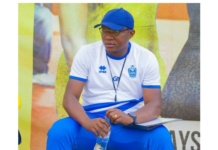A true legend of the African game, Sunday Oliseh’s credentials are plain to see. The Nigerian took part in two FIFA World Cups (1994 and 1998) and won the gold medal at the 1996 Men’s Olympic Football Tournament with the Super Eagles. Over the course of his career the midfielder played for several of Europe’s biggest clubs, including Borussia Dortmund, Juventus and Ajax.
At the FIFA U-17 World Cup United Arab Emirates 2013, Oliseh is using his expertise and experience in a different capacity. As a member of FIFA’s Technical Study Group (TSG), the 39-year-old has been tasked with analysing the tournament’s events. He has been impressed with what he has seen so far.
“The level is high,” Oliseh told FIFA.com. “What’s particularly stood out for me is the way that most sides really play as a team. Every player is disciplined in their position. That’s unusual in this age category and is a positive development.”
The former Nigeria captain has of course been paying close attention to the progress of his young compatriots, who have stormed into the semi-finals with some swashbuckling performances. “I’ve been very impressed with Nigeria,” Oliseh said. “The boys are extremely motivated but above all they’re very disciplined, which is very refreshing to see. They have a lot of good individual players.
“The way the side switches from defence to attack is very good, frequently with one-touch passes. That’s difficult to do as it requires a lot of movement, foresight and for all the players to support each other.”
For many observers the Golden Eaglets, the tournament’s top scorers with 20 goals so far, are the favourites to take the title. Their semi-final opponents are Sweden, who held Nigeria to a 3-3 draw in an entertaining group stage match. Yet that isn’t the only reason Oliseh is urging his countrymen to be wary.
“For me the biggest challengers are Sweden. They’re unbelievably strong tactically. I’ve watched two of their matches and each time they played quite differently. For instance, against Japan they sat back and allowed their opponent to have the ball. They were well-organised, looked for the gaps and were clinical in scoring their two goals.
Modern football on offer
“Against Honduras on the other hand, they controlled the game themselves, looked to keep possession and built attacks from the back,” Oliseh continued. “That impressed me a lot. On top of that they have talented individuals like Elias Andersson, Valmir Berisha and Gustav Engvall. It’s a very modern Swedish team. The boys are enjoying the tournament and you can tell they love playing football. That’s an important factor.”
While the Scandinavians have raised more than a few eyebrows with their progress to the last four in their maiden tournament appearance, another team has surprised Oliseh even more.
“For me it was Uzbekistan, even though they lost to Honduras in the Round of 16,” Oliseh said. “They impressed me a lot in the group stage, as they were superbly organised and made life really tough for their opponents with their tactically astute style of play and their physical strength.
“All of the players knew what their role was, they pressed well as a team and doubled-up on their opponents. You had the feeling they’d done their homework. In the last 16 they lost one of their most important players and made several changes in order to compensate for his absence. That was their undoing in the end.”
Despite his clear and incisive analysis, Oliseh refused to be pinned down on who he thought would lift the trophy. “Of course it’d be fantastic if Nigeria become world champions,” he said. “They certainly have the quality to do so, but in football you never know what might happen. For example, I’d never have thought that Uzbekistan would get knocked out by Honduras…”








